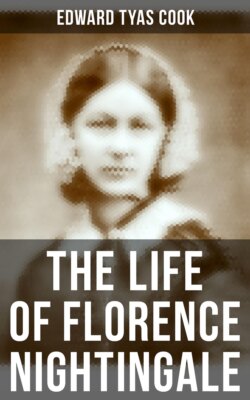Читать книгу The Life of Florence Nightingale - Edward Tyas Cook - Страница 6
На сайте Литреса книга снята с продажи.
II
ОглавлениеSo much, by way of preface, in explanation of the significance of Miss Nightingale's life and work. But this book endeavours to depict a character, as well as to record a career. There has been much discussion, in our days as in others, of the proper scope and method of biography, and various models are held up, in one sense or another, to practitioners in this difficult art. The questions are propounded, whether biography should describe a person's life or his character? his work or how he did it? If the person did anything worthy of record, a biography should, surely, describe alike the life and the character, the work and the methods. The biographer may fail in his attempt; but in the case of Miss Nightingale the attempt is peculiarly necessary, because all that she did and the manner in which she did it were, as it has seemed to me, characteristic of a strongly-marked personality behind them.
This book is, however, a biography and not a history. It is not a history of the Crimean War, nor of nursing, nor of Indian administration. Something on all these matters will be found in it; but only so much of detail as was necessary to place Miss Nightingale's work in its true light and to exhibit her characteristic methods. So, also, many other persons will pass across the stage—persons drawn from a great many different classes, occupations, walks in life; but the book does not aim at giving a detailed picture of “Miss Nightingale's circle.” Her relations, her friends, her acquaintances, her correspondents only concern us here in so far as their dealings with her affected her work, or illustrate her character.
Here, again—to revert to what has been said above—it will be found, I think, that this book possesses a certain significance as correcting, or supplementing, a popular legend. A preacher, in an obituary sermon upon Miss Nightingale, said that all her work was done “by force of simple goodness.” Assuredly Miss Nightingale was a good woman, and there was also a certain simplicity about her. But there was much else. A man of affairs, who in the course of a long and varied life had come in contact with many of the acutest intellects and greatest administrators of the time, said of Miss Nightingale that hers was the clearest brain he had ever known in man or woman. Strength of head was quite as marked in her as goodness of heart, and she had at least as much of adroitness as of simplicity. Her character was in fact curiously many-sided. A remarkable variety of interests, motives, methods will be found coming into play in the course of this record. The Florence Nightingale who will be shown in it—by her acts, her methods, her sayings, her ways of looking at things and people—is a very different person from Santa Filomena. Miss Nightingale has been given a place among the saints in the popular calendars of many nations; and she deserves the canonisation, but not entirely for the popular reasons. Her character, as I have endeavoured to depict it, was stronger, more spacious, and, as I have felt, more lovable than that of The Lady with the Lamp.
